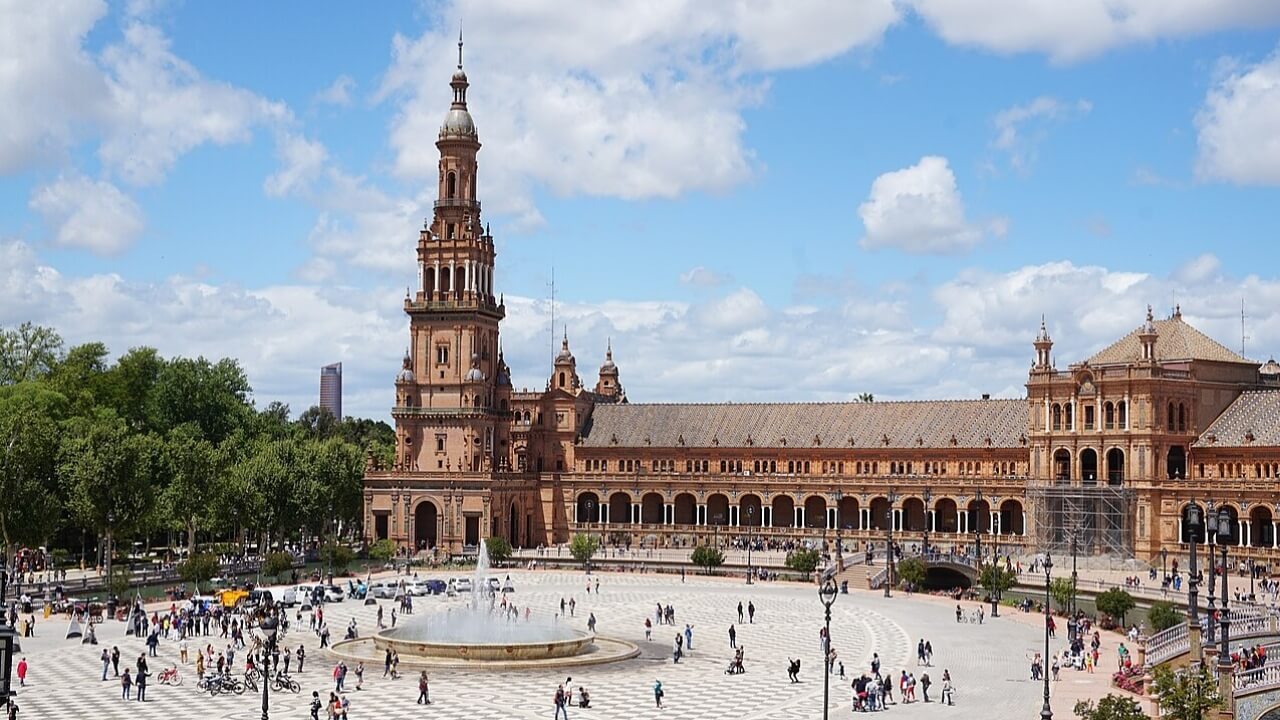13 Best Cities in Spain for Expats

I have been living in Spain for four years now, though I have been visiting ever since meeting a pretty Spanish girl many years ago. The young lady eventually agreed to marry me; twenty-five years later, we live in her home city, Huelva, Andalucia.
This Western European nation makes up most of the Iberian Peninsula and flanks both the Mediterranean and Atlantic Oceans. Spain (and neighboring Portugal) is fast becoming a favorite American expatriate destination. What’s more, the country’s digital nomad visa is appealing to the growing army of keyboard entrepreneurs tired of American life.
For those seeking a lifestyle transplant or others yearning for a cultural odyssey, Spain’s deep well of history, striking landscapes, and world-class food is hard to beat. Moreover, Spanish cities are among the most beautiful in the world and are replete with excellent public transport, healthcare services, and living costs. We’ve researched the coolest Spanish metropolises any U.S. wantaway might like to review.
1. Valencia

Spain’s third-largest city is renowned for its healthy, outdoors-based lifestyle. The home of paella carries a reputation as an inviting party town, its nightlife brimming with possibilities. By day, anyone can enjoy the beach or mountains.
What’s more, Valencia ranks as one of the healthiest cities in the world. It is Spain’s most affordable major city, according to many cost-of-living surveys.
2. Malaga

A similar place to Valencia is Malaga, though this southern Andalusian city is on the Costa del Sol. Malaga is a busy tourist zone due to its airport. It ranks as the second cheapest in the country, boasting incredible history and architecture.
Malaga’s proximity also means it has Europe’s warmest winters. I love Malaga for its white mountain villages scattered around the nearby mountains.
3. Vigo

Spain is a more diverse territory than many visitors realize. There are deserts in the interior, mile-upon-mile of agrarian, sunflower-covered plains, and mountains. The Northwest region of Spanish Galicia boasts the capital, Vigo. From some angles, it could be a Nordic city, with the city’s island-based layout and verdant greenery.
In contrast to Malaga’s sun-soaked warmth, Vigo’s temperate climate and casteño (Celtic) folklore might attract a different type of expat. This forgotten corner of Spain enjoys the fact it isn’t on most visitors’ lists. However, once you get there, you wonder why you never tried before.
4. Alicante

In Alicante, most tourist guides will tell people to visit Santa Barbara Castle, though for potential residents, this isn’t helpful. However, the ancient landmark creates a striking backdrop for residents, framing Postiguet Beach.
Life in Alicante is invariably about the beach, and the municipality has mile upon mile of sandy beaches with crystal-clear water. Due to its heavy sand grain, this corner of the Mediterranean has a unique ocean clarity.
5. Seville

I visit my nearest major city whenever I can, if anything, to warm up. Seville maintains comfortable average temperatures all year; even winter barely drops below 60ºF. The flipside, however, is searingly hot summers.
Seville is almost the perfect destination, in my opinion. It offers good value for money when dining out and attending live events. From an elevated perspective, Seville’s cathedral spires and castle turrets reach above the city, blending architectural history and modernized urban sprawl.
6. Madrid

The Spanish capital works as a good starting point for anyone new to Spain. While Madrid can be stressful like any other metropolis, London, Paris, or Amsterdam cannot compete with Madrid’s prices.
Furthermore, unlike most European capitals (looking at you, Rome), Madrid still feels like a truly Spanish place, where the most common dialect visitors hear is the local one. You can’t put a price on that.
7. Barcelona

Considered by My Spain Visa as the best city for young adults, the Catalan capital is on the Mediterranean coast. Catalans have a variation of Spanish living, with a different dialect and proud traditions that many believe deserve a separate national status.
Nevertheless, young English teachers, laptop professionals, and international company execs love the city’s whimsical charms. In Barcelona, Gothic architecture, endless plazas, and beaches come at a fraction of the cost compared to major U.S. cities.
Gazing over Barcelona from atop Sagrada Familia was an almost religious experience for me.
8. Bilbao

Northern Spain feels like a totally different country from the rest. I once drove from Huelva to Bilbao — it felt like I was arriving in a new country. Once you pass the Cantabrian Mountains in Spain’s north, the land becomes greener and distinctly Celtic.
Bilbao is built differently from Spain’s traditional cities. It feels like a quasi-Northern European municipality with modern architecture, infrastructure, and even a rotating bus, which Bilbao gave the nearby village of Elantxobe.
9. San Sebastian

The Basque Country is another unique corner (literally, it sits on the corner of France and Spain) of the Iberian Peninsula. The city is famous for its Baroque and Gothic landmarks, and it tumbles down into excellent beaches on both sides.
The city of San Sebastian is one of the most stunning locations in Europe. Locals can stroll through the Old Town or “Romantic Area” and enjoy pintxos (varied open sandwiches) washed down with a local cider or wine.
For more adventurous types, the area hosts the World Surf League event at Mundaka, a renowned surf Mecca.
10. Cadiz

Thought to be the oldest city in Western Europe, Cadiz was once a thriving trading post for the Phoenicians, who founded its economy. This enclave sits on a sandbar and links via a sand spit (or tombolo) to the mainland.
The city marks the beginning of the Costa de la Luz, although Cadiz is washed in sunlight and history. Its province contains dozens of Roman, Moorish, and Tartessian historical sites.
While affordable, Cadiz is small, and its limited local job market renders external revenue crucial for expats who choose to live there.
11. Palma de Mallorca

The Balearic Islands are made up of four islands: Ibiza, Formentera, Menorca, and Mallorca. The capital, Palma de Mallorca, governs the entire archipelago and is a haven for European expats, especially remote workers.
Of course, digital nomads yearn for the city’s proximity to world-class beaches, secret coves, and secluded bays. However, they must integrate themselves and give back to the local community to be accepted. In recent times, locals have made noise about excessive tourism.
12. Ayamonte

While this isn’t a city, Ayamonte is at Spain’s Southwesternmost corner of the Guadiana River, which borders Portugal. This town might appeal more to retired expatriates or families escaping urban hustle and bustle.
The seaside location gives access to plentiful golden beaches, while the border proximity opens up Portugal’s Algarve and Alentejo Provinces for excursions. Furthermore, this corner of Spain is full of championship-level golf courses, attracting thousands of winter “sunbirds” working on their drive.
13. Huelva

Of course, how could I not mention my home city, Huelva? While it can’t compete with Seville for aesthetics, Huelva compensates with a laid-back lifestyle, unbelievable rental prices, and exquisite local cuisine. The province is famous (though not famous enough) for its jamón Ibérico (Iberian ham), an elite-level product reared in its northern mountain valleys.
If culture is your thing, nothing comes close to Huelva during Semana Santa — or Easter week. The city comes alive with the rhythm of drums, wind instruments, and fireworks as various local Catholic chapters march the cobbled streets.





